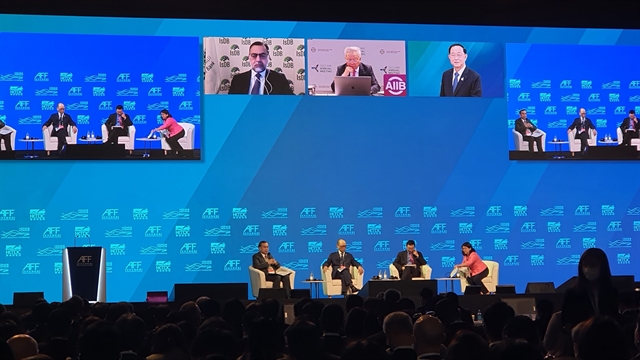 Economy
Economy


|
| Delegates at a plenary session of the 16th Asian Finance Forum (AFF) in Hong Kong. VNS Photo Ly Ly Cao |
Ly Ly Cao
HONG KONG — Collaboration and connection were highlighted by delegates at the 16th Asian Finance Forum (AFF) held on Wednesday in Hong Kong to solve global uncertainties, including soaring global inflation, higher interest rates, geopolitical tensions, net zero commitment, and an aging population.
Organised by the Government of the Hong Kong Special Administration Region (HKSAR) and the Hong Kong Trade Development Council (HKTDC), this year’s AFF attracted more than 100 international business leaders, policymakers, financial and wealth management experts, entrepreneurs, tech giants, and economists to deliver their speeches.
The two-day event, themed "Accelerating Transformation: Impact - Inclusion - Innovation," also marks the reopening of the port city after lockdowns for more than two years due to COVID-19.
Entering 2023, the world economy continues to confront 2021’s problems, which were result of the COVID-19 pandemic, like higher borrowing costs, rising inflation, supply chain disruptions, a food and energy crisis, and the Russia - Ukraine conflict. And these issues cast doubt on the 2023 economic outlook.
Teresa Kho, director general of the Asia Development Bank, said that: "The world and our region still face multiple challenges. The supply chain shocks, policy constraints, and tighter financial conditions are putting pressure on the growth prospects."
"ADB forecasts slow global economic growth in 2023. We have downgraded our growth forecast for three economies, the US, Japan, and the Europe area to 0.4 per cent this year."
And climate change is one of the long-term problems that is beyond the ability of any single country; therefore, global cooperation is essential, she added.
"Globalisation has delivered extraordinary outcomes to developing countries, and Asia has been one of the biggest beneficiaries of globalisation," said Kho.
Similarly, Arkhom Termpittayapaisith, Thailand's Minister of Finance, believes that good global cooperation and strong commitments can be the keys to addressing global problems.
"As the climate problems become more severe and have a widespread impact on all economies, it is everyone’s responsibility to take charge," Arkhom Termpittayapaisith said at the event.
He also suggested governments should take a lead and play a proactive role by actively developing an ecosystem for sustainable finance in collaboration with all stakeholders within the financial sector and equally sharing the risks and rewards.
Meanwhile, Tao Zhang, Chief Representative for Asia and the Pacific at the Bank for International Settlements, said that global economies have to collaborate to cool inflation.
"Right now, the most important task for us is how to keep global inflation low and stable," said Liqun.
As the gateway linking the world with Asia and vice versa, the reopening of Hong Kong is expected to greatly contribute to global cooperation.
John Lee, Chief Executive of the Hong Kong Special Administrative Region of the People’s Republic of China, said that despite the uncertain outlook in the short term, Hong Kong’s future is bright, providing a favourable environment for businesses.
“We offer companies and investors a business-enabling environment, internationally aligned regulations and a free flow of capital and people, as well as plentiful opportunities coming from our deepening integration with national development,” said Lee.
And Hong Kong also welcomes Vietnamese investors and entrepreneurs to establish businesses here, Patrick Lau, Deputy Executive Director of HKTDC, told Việt Nam News.
“Hong Kong and Việt Nam have such a close working relationship. We definitely encourage more Vietnamese enterprises to use the Hong Kong platform because Hong Kong is not only for fundraising, it is a whole ecosystem,” Lau said.
“We have the stock exchange as a fundraising platform, we also have a group of advisors to help you find business partners, even if your company is not listed.” — VNS




